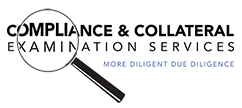Working Capital
Asset Based Lending Examinations are generally conducted in connection with working capital lines of credit, since they are generally riskier.
Accounts receivable and inventory collateral changes on a daily basis as inventories are purchased and then sold, which creates an accounts receivable that may or may not be collectible, depending on a variety of factors.
As part of our due diligence services, Compliance & Collateral Examination Services determines if:
- Accounts receivables and inventories are accurately and promptly reported on borrowing base reports.
- Identification of accounts receivables that are ineligible are being correctly reported: delinquent, weak, subject to various contra offsets, affiliated, government accounts, foreign, and many other accounts receivable categories that impact the quality of the company’s sales and collateral base.

- Identification of inventories that are work in process, slow moving, on consignment, specialized, obsolete, damaged and many other conditions that impact the quality of the inventory collateral are being correctly reported.
- The machinery and equipment in a floor plan facility is available for sale and being properly cared for at the scheduled locations.
- Floor planned equipment movement is being promptly and accurately reported and that proceeds from the sale of equipment are promptly remitted to you as the secured lender.
To determine the risk involved, our due diligence process routinely includes:
- Asking for various books and records in digital form in advance of a field visit to conduct various analytical review analyses, including overall financial analysis and account analysis using various data analytic procedures.
- Interviewing the subject company about non-financial and financial matters based on results of our pre-contact due diligence and records review.
- Based on responses to the interview, developing test samples to gain a better understanding of the subject company’s internal controls and issues impacting the value of the assets to be used as collateral for the working capital loans.
- Scheduling a field visit to meet with management staff, to observe the products and services offered by the subject company, and to complete our prepared tests.
- Analyzing test results and conversing with management staff regarding questions or concerns with the test results.
- Preparing a final report of our findings.
Pre-funding full scope examinations normally include a 24-month trend analysis of working capital accounts and other asset and liability accounts of interest. These exams include detailed descriptions of the business activities from its origination to the current period, including changes to organizational structure, product and service offerings, geographical coverage, operating locations, significant ownership and management changes, and financial performance. Of special focus is the investigation of internal controls over collateral and any issues impacting collateral valuation and quality.
Recurring examinations are similar to pre-funding examinations but are limited to the period since the last examination.
Asset based lending examinations are generally conducted in connection with working capital lines of credit since they are generally riskier. Accounts receivable and inventory collateral changes on a daily basis as inventories are purchased and then sold, which then creates an accounts receivable that may or may not be collectible, depending on a variety of factors.
Equipment and real estate loans are not subject to the same risk volatility. That is not to say, however, that a creditor providing real estate and equipment loans would not be interested in checking debtor representations of financial condition and performance.
Limited Scope Examinations
Limited scope examinations are less comprehensive than full scope examinations, They are limited to various facets of a full scope examination. For example, a limited scope examination might be limited to
- a review of accounts receivable and inventory activity and/or testing
- inventory valuation and/or count testing
- checking the accuracy of the accounts receivable and/or accounts payable agings
